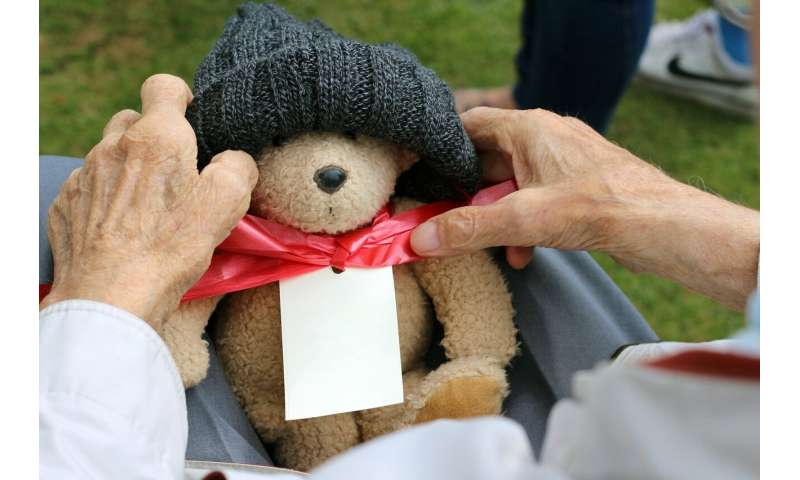Care for the caregiver in the age of coronavirus

While staying at home to help reduce the spread of COVID-19 can be challenging, doing so as someone who’s providing in-home care for vulnerable adults comes with added complications.
There are more than 43 million caregivers in the U.S. providing unpaid care for those 65 and older with a variety of physical and cognitive limitations.
Dr. Karina Berg is a geriatrician in the Center on Aging at UConn Health who, under normal circumstances, offers a four-week caregiver course twice a year in collaboration with the Connecticut chapter of the Alzheimer’s Association. While that’s on hold, she offers some advice for caregivers in light of the COVID-19 pandemic.
What should home caregivers watch for in the people in their care?
Fever, dry cough, and shortness of breath are the most common symptoms, but we now know that other symptoms can be present too, including headaches, body aches, sore throat, and fatigue. Since older people often have uncommon symptoms, caregivers should also look for any significant change in appetite or energy.
Caregivers should also look for signs of increased stress, which can show as behavior changes, including agitation or irritability. There is a lot of increased anxiety coming from many places and everyone is affected by that. It might help to shield people from the TV and focus on enjoying the present as much as possible.
If someone in my care at home is showing symptoms, what’s the best course of action to seek care?
Unless the person is having acute breathing problems or other significant distress, it’s best to call the UConn Health COVID call center (860-679-3199). The clinicians who staff the hotline can answer any questions and help people decide if, when, and where to seek care. This can reduce potential exposure in hospitals, urgent care centers, and doctor’s offices, and save the emergency room for COVID-19 emergencies.
Caregivers should be reassured that even though appointments and procedures are being canceled, health care providers still are available by phone and often by video, and they can answer questions about ongoing medical issues that may not be related to COVID-19.
Independent of other things, is age itself a risk factor for contracting COVID-19 or for experiencing complications from it?
Anyone can be infected with coronavirus, which causes COVID-19, but yes, overall, older adults are more likely to have complications when infected compared to younger adults and children. It’s important to note that younger people also are requiring hospitalization, so caregivers have to follow national- and state-level guidelines for themselves too.
What happens when a patient is diagnosed with COVID-19 but well enough to recover at home?
The infected person should stay in one room and should be cared for by one designated caregiver who follows strict precautions. Ideally the infected person should use a separate bathroom. If others need to use the bathroom, then high-touch surfaces including toilet and sink handles, countertops, door knobs, and grab bars should be disinfected frequently. Tissues should be discarded in a trash can with a bag and it should be emptied often.
What can caregivers do to enhance their own self-care and well-being?
Because of the toll that COVID-19 is taking on our society and the social distancing and isolation from community, many people of all ages are experiencing symptoms of anxiety or depression. It is very important to find ways to connect with family or friends by phone, video, or through window visits when appropriate. A walk, either alone or with a family member, is fine and has a positive effect on mood for both caregiver and recipient. Being outdoors is safe as long as people are not with or near other people. The social distancing is also providing an opportunity to find indoor projects that everyone can work on.
It’s important to keep in mind that care recipients need their caregivers to remain calm and positive.
What extra precautions need to be taken for caregivers who are living with a person whose health may be at greater risk?
Caregivers should follow national- and state-level guidelines. The most important aspect is that people continue to follow these precautions because adherence often declines over time.
- The most important thing is frequent hand washing, meaning several times a day and always before eating. People should be sure to include the palms, back of the hands, between the fingers, the fingertips and nails, thumbs and wrists. This should take at least 20 seconds or the time it takes to sing “Happy Birthday” twice.
- Stay home. Limit excursions to once a week only for essential items like medications or groceries. Many stores have delivery services.
- Avoid close contact with people who are sick.
- Avoid touching your eyes, nose, and mouth with unwashed hands.
- Soap and water are preferable but if they are not available, an alcohol-based hand sanitizer that contains at least 60% alcohol is beneficial.
- Make sure you have extra medication/supplies but be reassured that pharmacies will stay open and health care providers are available.
- Guidelines are being reviewed every day so watch for updated guidelines, especially concerning face masks.
If you are sick, to keep from spreading respiratory illness to others, you should:
- Stay home.
- Cover your cough or sneeze with a tissue, then throw the tissue in the trash.
- Frequently clean high touch surfaces. (Since many people have household bleach at home, I have been recommending a diluted bleach solution that is easily made by adding 4 teaspoons of bleach to 4 cups of water.)
- Wash and replace hand towels frequently.
What about caregivers for those in assisted living or other congregate housing?
Source: Read Full Article


